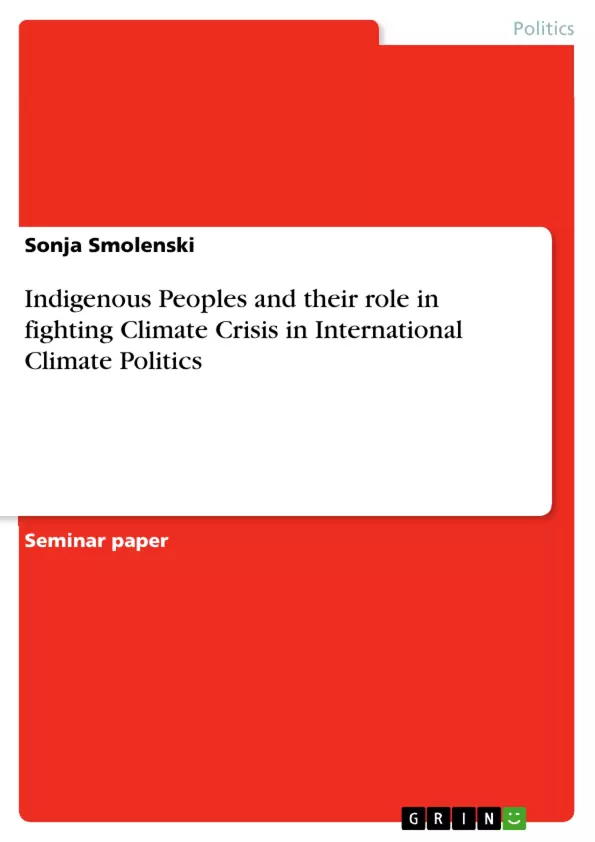The following paper examines the implementation of indigenous rights in international climate policy to date. First it will show why the climate crisis is a component of colonial continuities in order to better understand what roles indigenous peoples play in international climate policy today. After that, the impact of the climate crisis on the rights of indigenous peoples and why they are at the same time a key figure in the fight against climate change will be revealed. The third section highlights the demands of indigenous associations that are supported by international law. The main section then analyzes previous international climate negotiations and decisions and shows the challenges that have arisen to date in the inclusion of indigenous rights.
Indigenous peoples, who comprise an estimated 400 million people worldwide or 5% of the total population in more than 90 Countries, are one of the communities most affected by climate change and simultaneously play a key role in climate change mitigation through their centuries-old, nature-adapted ways of life. The international community and the climate research community have long overlooked the important role that indigenous peoples have in combating climate change, and have excluded their perspectives from climate negotiations, even though they have the necessary knowledge and manage the most resource-rich areas of the world. 80% of the world's remaining biodiversity is located in indigenous territories, which are in or near 85% of the world's protected areas . Indigenous peoples manage at least 17% of the carbon that is stored in global forests. This is equivalent to 33 times the global energy emissions from 2017. Indigenous lands, such as the Amazon basin with its rainforest resources, thus harbor enormous potential to mitigate climate change and its consequences .
Inhaltsverzeichnis (Table of Contents)
- Introduction
- Indigenous Peoples and Climate Change
- Definition, research status and postcolonial theory
- Colonialism and Climate Change
- Effects of Climate Change on Indigenous Peoples rights
- Combating climate change with the help of indigenous knowledge
- Indigenous Peoples and International Climate Politics
- Demands of Indigenous Peoples in climate negotiations
- Legal Framework
- Implementation and Challenges of Indigenous Rights in Climate Conference Negotiations and Measures
- Implementations in Climate Conference Negotiations
- Challenges in Implementing Climate Measures and Negotiations
- Conclusion
Zielsetzung und Themenschwerpunkte (Objectives and Key Themes)
This term paper investigates the implementation of indigenous rights in international climate policy, highlighting their crucial role in both mitigating and adapting to climate change. The paper explores the historical and ongoing impacts of colonialism on indigenous peoples and their relationship with climate change, emphasizing the importance of incorporating their knowledge and perspectives into climate policy.
- The interconnectedness of colonialism and climate change, highlighting the colonial legacies that continue to impact indigenous communities.
- The effects of climate change on indigenous peoples' rights and their unique vulnerabilities to climate-related threats.
- The vital role of indigenous knowledge in climate change mitigation and adaptation, emphasizing the importance of integrating their traditional practices and perspectives into climate policy.
- The demands of indigenous peoples in international climate negotiations and the legal framework that supports their claims for recognition and inclusion.
- The challenges and successes in implementing indigenous rights in climate negotiations and policies, exploring the ongoing efforts to ensure their full participation and representation.
Zusammenfassung der Kapitel (Chapter Summaries)
- Introduction: This chapter establishes the critical role of indigenous peoples in climate change mitigation and adaptation, highlighting the historical neglect of their knowledge and perspectives by the international community. It underscores the importance of understanding their ways of life and the potential they hold in combating climate change.
- Indigenous Peoples and Climate Change: This chapter delves into the definition of indigenous peoples and explores the historical and contemporary impacts of colonialism on their relationship with climate change. It examines the vulnerabilities of indigenous communities to climate change and their unique knowledge systems that offer valuable solutions to climate challenges.
- Indigenous Peoples and International Climate Politics: This chapter focuses on the demands of indigenous peoples in international climate negotiations, outlining their legal framework and their aspirations for recognition and inclusion in climate decision-making. It emphasizes the importance of their voices in shaping climate policy.
- Implementation and Challenges of Indigenous Rights in Climate Conference Negotiations and Measures: This chapter analyzes the implementation of indigenous rights in climate conferences and policies, highlighting the challenges and successes encountered in integrating their perspectives into climate negotiations. It discusses the ongoing efforts to promote their full participation and representation in decision-making processes.
Schlüsselwörter (Keywords)
This term paper focuses on the intersection of international climate politics, indigenous rights, and climate change. Key terms include indigenous knowledge, climate change mitigation, adaptation, colonial continuities, postcolonial theory, climate negotiations, and international law.
- Quote paper
- Sonia Smolenski (Author), 2021, Indigenous Peoples and their role in fighting Climate Crisis in International Climate Politics, Munich, GRIN Verlag, https://www.grin.com/document/1154522



